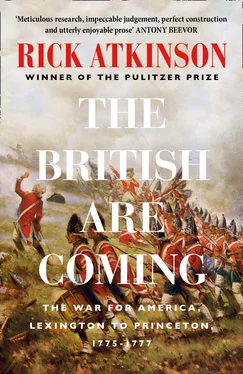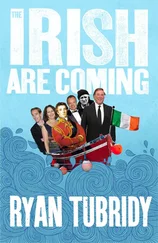For those whose carriages and sedan chairs kept them above such hurly-burly, the queen’s birthday, on January 18, marked the traditional opening of London’s social season, with Parliament scheduled to convene the following day. Charlotte had been an obscure, drab German princess in 1761 when George chose her sight unseen to be his queen. During the voyage across the North Sea to Britain she took English lessons and learned to play “God Save the King” on the harpsichord; they were wed in St. James’s Palace six hours after her arrival. At his instruction, the marriage bedroom decor included seven hundred yards of blue damask, a mahogany four-poster with five mattresses, and large glass basins of goldfish. The happy union proved fecund—she produced children with lunar regularity, eventually to number fifteen—and her birthday was always cause for carefully orchestrated jubilation at St. James’s.
A peal of bells marked the day, with an oration by the archbishop of Canterbury and an ode by a royal chorus. The poet laureate scribbled verse to fill up strophes, antistrophes, and various declamations on Charlotte’s virtues. The Tower guns fired at one p.m., and illuminations brightened Westminster; those at the French ambassador’s house were exceptionally radiant, a tribute, it was said, from Queen Marie Antoinette as a gesture of royal sisterhood. But it was the birthday ball that had kept West End milliners, mantua makers, and bespoke shoe cobblers in a stitching frenzy for weeks.
The evening began badly. A fine day turned wet, and churning fog limited the visibility around St. James’s to five yards. Even footmen wielding white wands could not prevent the collision of several coaches, with bones broken and horses entangled. Constables spotted seven suspected pickpockets sidling through the pandemonium, and marched them off to Bridewell Prison. The guests soldiered on, rescuing the night through determined elegance. Pigmented ceruse rouged the cheeks, and wigs were powdered to make the eyes appear brighter, an effect enhanced by false eyebrows made from mouse skins, which were applied with gum. “The dresses were splendid and magnificent, much beyond anything I had ever before seen,” one foreign visitor wrote. “The queen appears amiable.” Of 177 peers of the realm, including 23 dukes and 77 earls, a gratifying number strode through the fog to attend their amiable queen, who wore a new diamond stomacher over her brocaded gown, with matching necklace and earrings. The minuets began at nine p.m. and continued for two hours, followed by country dances. The Morning Chronicle would assure its readers that “more brilliants were never there at one time than was seen last night.”
The king, regal in a suit of blue velvet trimmed in silver, appeared to be a happy man. Few knew that George’s good spirits derived not only from a successful fête for his queen, but from hopes that a decisive strategy had emerged to crush the American insurgency once and for all. During secret meetings this week at offices in Cleveland Row, a narrow street behind St. James’s, cabinet ministers—heeding their monarch’s sensible request for “a general plan”—drafted a scheme to send more regiments, warships, cash, and marines to Boston, along with instructions for hunting down insurgent leaders. But first, Parliament would have to agree.
For more than two hundred years, the House of Commons had met in St. Stephen’s Chapel, built within the palace of Westminster in the twelfth century for the monarch’s private worship. Window glass depicted biblical stories. Peacock feathers and squirrels’ tails had been used to paint angels on the walls and saints around the altar; white down plucked from the breasts of royal swans was daubed in paint to inflect the high blue ceiling with thousands of gold stars. When Henry VIII shifted to a new palace at Whitehall, old choir stalls became members’ benches, a Speaker’s chair replaced the altar, whitewash covered the wall paintings, and the spangled ceiling was lowered to improve the acoustics. Architect Christopher Wren added galleries above the debating chamber, which was smaller than a tennis court. The hall retained an ecclesiastical air, even as parliamentarians cracked nuts, peeled oranges, or wandered out through the lobby for a game of whist and a glass of Madeira.
On January 19, when the Commons reconvened after the Christmas holiday, members as usual were packed like sprats in a tin. With a thud, a clerk dropped 149 documents on a central table, announced that they were “papers relating to the disturbances in North America,” and in a somber tone began to read the titles of each: Royal Navy dispatches from American waters; seditious extracts from the Continental Congress; reports written by royal officials from New Hampshire to Georgia; official correspondence from London to colonial governors.
Slouched on the Treasury bench to the right of the Speaker’s chair, a corpulent, round-shouldered figure listened as the recitation droned on, his eyelids so heavy that he appeared to be dozing. Thick-lipped, with both brow and chin receding, he was said to have a tongue “too large for his mouth” and “prominent eyes that rolled about to no purpose.” No matter: Lord Frederick North, a man without vanity who referred to himself as “an old hulk,” was always pleased to be underestimated.
In the first decade of George III’s reign, six men held the office of prime minister, better known at the time as chief or first minister. They had little in common other than slender competency and an unsteady handling of Parliament. In 1770 the king turned to a childhood playmate—he and North had acted together in a schoolboy production of Joseph Addison’s Cato —and a political partnership began that would endure through a dozen difficult years. George knew he had his man when he wrote North just a few months into his new chief minister’s tenure, pleading for £13,000 in cash by day’s end because of “a most private and delicate” need—the Duke of Cumberland had successfully sued the king’s younger brother after catching him in flagrante delicto with his wife. North replied within hours that he had “no doubt of being able to procure the sum desired … in such a manner to keep it as much out of sight as possible.” George answered, “This takes a heavy load off of me.”
Even his adversaries adored North, a man “of infinite wit and pleasantry,” as one admitted. A diplomat added, “It was impossible to experience dullness in his society.” Now forty-two, the son of an earl, he was a gifted Greek and Latin scholar, adept in French, German, and Italian, with an adhesive memory, a youthful delight in the absurd, and “a temperament completely free from irascibility,” as one admirer observed. A happy husband and a doting father to six children, he was generous, companionable, and honest. “He kept his hands clean and empty,” a colleague wrote, while another noted, “What he did, he did without a mask.” North held a constituency in Banbury with fewer than two dozen eligible voters, who routinely reelected him after being plied with punch and cheese, and who were then rewarded with a haunch of venison.
Capable of reciting budget statistics for hours without consulting a note, he supervised national finance as head of the Treasury Board. Deft in debate, North was the principal defender of government policy in the Commons. In the past year he had delivered more than a hundred speeches on various measures, most of them harsh, relating to America. Many more such speeches lay ahead.
Ahead, too, lay calamity. By his own recent acknowledgment, North was “fond of indolence and a retired life.” Averse to confrontation and an instinctive conciliator, he was given to melancholy and indecision. Now he was fated to be a war minister, with his king’s empire in the balance. He could talk tough, as in his claim that “America must fear you before they will love you” or his assurance to the Commons that “four or five frigates” could close Boston Harbor because “the militia of Boston were no match for the force of this country.” Yet colleagues sensed that his heart was not in it; he lacked, one said, the requisite “despotism and violence of temper.” His confession that “upon military matters I speak ignorantly, and therefore without effect” revealed his ambivalence.
Читать дальше












